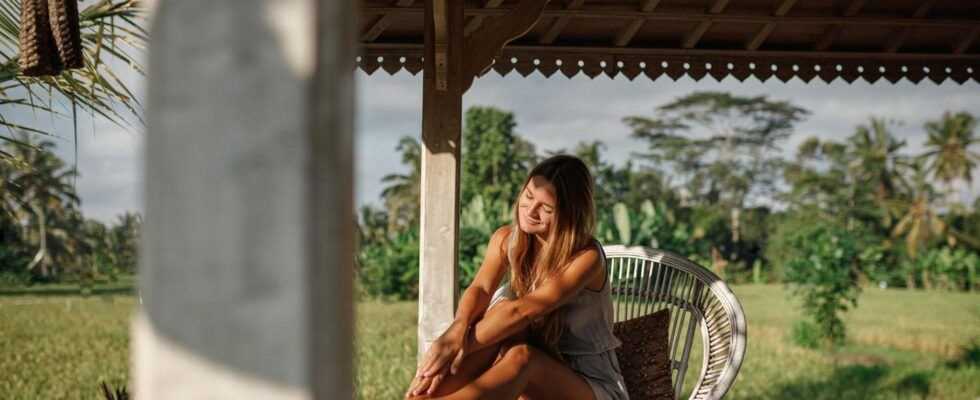interview
Asked
Traveling sustainably – is that also comfortable?
© PhotoSunnyDays / Shutterstock
Travel sustainably – in theory we all want that. In practice, you then come across one or the other hurdle. Can sustainability also be comfortable? And what do I have to pay attention to? We asked about it.
My partner and I are planning our vacation. It should go south and be sustainable. After all, in recent years we have not only learned to appreciate our surroundings, but have also felt the consequences of climate change. And since we were disturbed by Corona in our travel routine anyway, you can rethink it right away. I agree. Until I do my research and a short time later I put my head on the table.
Do we really have to go by train? And what if we drive twelve hours, but the accommodation greets us with plastic bottles? Is that still environmentally conscious? What is it anyway, sustainable? And anyway, is that possible with a little comfort? Not that I’m ready for a vacation after my vacation!
Fittingly, I planned an interview with Daniela Jahn the next day. She founded the platform “hiersein”, which not only provides sustainable accommodation in Germany, but also gives all-round tips. Now she has the responsible task of saving my relationship and my vacation – and I pester her with questions that she answers with such a relaxed laugh that I quickly find my desire to travel again. Phew!
Inquiry: How do you travel sustainably – comfortably?
Dear Daniela, you come as if you are called – I am a bit desperate while researching a sustainable holiday. Where were you last?
“Well, to be honest, it doesn’t even have to be Germany. My husband and I were looking forward to looking for a rustic house in Tuscany after we had been vaccinated twice. What I really liked was that Italy now has a focus on sustainability: They have public offices everywhere where you can tap drinking water for free. The water is specially treated. When we got to the house, there were already full glass bottles with a description of where we were can refill them! Over the years I’ve got a nose for which accommodation suits me and corresponds to my values. “
And how do you get that nose if you don’t deal with it professionally? Do you have some kind of checklist when planning your trip?
“There are several things I look for when looking for a place to stay. For example:
- Can I see on the page that the host is being introduced as a person? On my side, it’s about sleeping with real people and not in completely stylish accommodations, as you often find on the large, anonymous booking platforms.
- Does the person have a knack for setting up the accommodation? And if so, how? I make sure that not everything looks the same.
- How is the house built? A wooden house, for example, speaks more for a sustainable construction method than a concrete block, for which a lot of energy is used in the production of the building material alone.
- What do the hosts write? Some say, for example, that they have solar panels and that some of them produce their own electricity.
But there are also things about which I would be skeptical if the topic is promoted too much. “
So there is also “too much”?
“For example, when accommodations are very much on the organic topic and you get the feeling pretty soon that there is actually only advertising talk behind it. For example, I recently saw such a self-proclaimed organic hotel again with a photo from breakfast which showed the entire no-go assortment of jam in plastic bowls, individually packed butter and tropical fruits. I prefer it when someone says I have a meadow with orchards and put the homemade jam on the table. “
And what criteria do you use to choose sustainable accommodation?
“I have a questionnaire in which I ask four areas:
- Nature and the environment: How is the garden handled? Have insect-friendly flowers or perennials been planted for more biodiversity? Is there such a thing as a bee colony? How is energy and water used? What does the waste separation and plastic avoidance look like?
- Food: Where does the food that is on offer come from? Do the suppliers come from the region?
- House: what is it made of? Were natural, ecological materials used in the renovation? What about the insulation and heating? For example, many have wall heaters integrated in the clay plaster, which can store and release the heat for much longer.
- Person: How are employees dealt with? Is there perhaps a social commitment in the village or projects?
And then of course I try to convince myself of it personally. Ultimately, when you talk to the hosts, you realize how authentic it really is. “
There is a lot to consider here. Can you travel comfortably AND sustainably?
“I have to laugh, because the image of the felting and crocheting hostess is still attached to sustainability. But yes: There is the entire spectrum. From camping accommodation to 150sqm accommodation, which can also be sustainable if, for example, you use it properly I try to spread that: Sustainable travel does not have to be sacrificed, it can be a gain. It can also be an inspiration for how I can live sustainably at home with a profit. “
Thank you very much for the interview!

